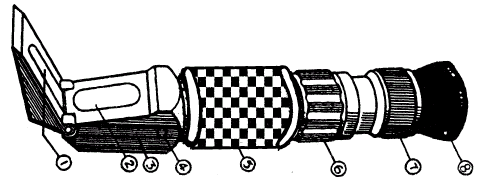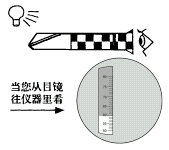developed for working with sugar related liquids(fruit juices、honey、soft drinks、wine),help monitor and control sugar concentrations in foods and beverages.Whether users are checking the“ripeness”of fruit in the field,verifying product quality after harvesting,or controlling concentrations during processing and packaging,refractometers provide critical information to ensure product quality.It is also commonly used for controlling the concentration of various industrial fluids(cutting lubricants and flux rinsing compounds).Which model to chose is according to the concentration in the liquids and the parameter of refractometer.
SERIES:
| Style |
Model |
Range |
Min.Div |
Accuracy |
Remarks |
| Sugar Refractometer |
RHB0-80 |
0-80Brix |
0.1%Brix |
±0.1% |
Without ATC |
Parts Diagram:

OPERATING INSTRUCTION:
Step 1
Open the cover plate(1),Clean the refraction prism(2) carefully with soft flannelette,Be careful not to scrape the refraction prism surface. |
 |
Setp 2
Put some drops of solution on the refrection prism surface and then cover the cover plate(1) slowly so as to let the solution be all over the prism surface. |
 |
Setp 3
Adjust the cover plate(1)against the light soure or bright place.Turn the visual range ring(7)until the graduated lines can be seen clearly.The readings of the demarcation line between brightness and darkness just indicate the sugar content in the solution.
For modle RHB-80.We can choose the range 0~50% or 50~80% by rotateing the knob(6). |
 |
TEMPERATURE CORRECTION
Put several drops of distilled water on the surface of the refraction prism(2).Adjust the adjusting screw (4) until the demarcation line between brightness and darkness is just on the graduated line 0%;Then proceed on the measurement of the testing object,and the reading thus obtained is the correct one.
Another methods for obtain the exact value is consulte with the temperature correction table,A temperature correction value must be added to (or subtract from)the scale reading.
The Attached Temperature Correction Table for readings of sugar content measuring gage.
| |
concentration(%) |
| 0 |
5 |
10 |
15 |
20 |
25 |
30 |
35 |
40 |
45 |
50 |
55 |
60 |
65 |
70 |
| Temperature |
10 |
To be subtracted from |
0.50 |
0.54 |
0.58 |
0.61 |
0.64 |
0.66 |
0.68 |
0.70 |
0.72 |
0.73 |
0.74 |
0.75 |
0.76 |
0.78 |
0.79 |
| 11 |
0.46 |
0.46 |
0.53 |
0.55 |
0.58 |
0.60 |
0.62 |
0.64 |
0.65 |
0.66 |
0.67 |
0.68 |
0.69 |
0.70 |
0.71 |
| 12 |
0.42 |
0.45 |
0.48 |
0.50 |
0.52 |
0.54 |
0.56 |
0.57 |
0.58 |
0.59 |
0.60 |
0.61 |
0.61 |
0.63 |
0.63 |
| 13 |
0.37 |
0.40 |
0.42 |
0.44 |
0.46 |
0.48 |
0.49 |
0.50 |
0.51 |
0.52 |
0.53 |
0.54 |
0.54 |
0.55 |
0.55 |
| 14 |
0.33 |
0.35 |
0.37 |
0.39 |
0.40 |
0.41 |
0.42 |
0.43 |
0.44 |
0.45 |
0.45 |
0.46 |
0.46 |
0.47 |
0.48 |
| 15 |
0.27 |
0.29 |
0.31 |
0.33 |
0.34 |
0.34 |
0.35 |
0.36 |
0.37 |
0.37 |
0.38 |
0.39 |
0.39 |
0.40 |
0.40 |
| 16 |
0.22 |
0.24 |
0.25 |
0.26 |
0.27 |
0.28 |
0.28 |
0.29 |
0.30 |
0.30 |
0.30 |
0.31 |
0.31 |
0.32 |
0.32 |
| 17 |
0.17 |
0.18 |
0.19 |
0.20 |
0.21 |
0.21 |
0.21 |
0.22 |
0.22 |
0.23 |
0.23 |
0.23 |
0.23 |
0.24 |
0.24 |
| 18 |
0.12 |
0.13 |
0.13 |
0.14 |
0.14 |
0.14 |
0.14 |
0.15 |
0.15 |
0.15 |
0.16 |
0.16 |
0.16 |
0.16 |
0.16 |
| 19 |
0.06 |
0.06 |
0.06 |
0.07 |
0.07 |
0.07 |
0.07 |
0.08 |
0.08 |
0.08 |
0.08 |
0.08 |
0.08 |
0.08 |
0.08 |
| 20 |
|
0 |
0 |
0 |
0 |
0 |
0 |
0 |
0 |
0 |
0 |
0 |
0 |
0 |
0 |
0 |
| 21 |
To be added to |
0.06 |
0.07 |
0.07 |
0.07 |
0.07 |
0.08 |
0.08 |
0.08 |
0.08 |
0.08 |
0.08 |
0.08 |
0.08 |
0.08 |
0.08 |
| 22 |
0.13 |
0.13 |
0.14 |
0.14 |
0.15 |
0.15 |
0.15 |
0.15 |
0.15 |
0.16 |
0.16 |
0.16 |
0.16 |
0.16 |
0.16 |
| 23 |
0.19 |
0.20 |
0.21 |
0.22 |
0.22 |
0.23 |
0.23 |
0.23 |
0.23 |
0.24 |
0.24 |
0.24 |
0.24 |
0.24 |
0.24 |
| 24 |
0.26 |
0.27 |
0.28 |
0.29 |
0.30 |
0.30 |
0.31 |
0.31 |
0.31 |
0.31 |
0.32 |
0.32 |
0.32 |
0.32 |
0.32 |
| 25 |
0.33 |
0.35 |
0.36 |
0.37 |
0.38 |
0.38 |
0.39 |
0.40 |
0.40 |
0.40 |
0.40 |
0.40 |
0.40 |
0.40 |
0.40 |
| 26 |
0.40 |
0.42 |
0.43 |
0.44 |
0.45 |
0.46 |
0.47 |
0.48 |
0.48 |
0.48 |
0.48 |
0.48 |
0.48 |
0.48 |
0.48 |
| 27 |
0.48 |
0.50 |
0.52 |
0.53 |
0.54 |
0.55 |
0.55 |
0.56 |
0.56 |
0.56 |
0.56 |
0.56 |
0.56 |
0.56 |
0.56 |
| 28 |
0.56 |
0.57 |
0.60 |
0.61 |
0.62 |
0.63 |
0.63 |
0.64 |
0.64 |
0.64 |
0.64 |
0.64 |
0.64 |
0.64 |
0.64 |
| 29 |
0.64 |
0.66 |
0.68 |
0.69 |
0.71 |
0.72 |
0.72 |
0.73 |
0.73 |
0.73 |
0.73 |
0.73 |
0.73 |
0.73 |
0.73 |
| 30 |
0.72 |
0.74 |
0.77 |
0.78 |
0.79 |
0.80 |
0.81 |
0.81 |
0.81 |
0.81 |
0.81 |
0.81 |
0.81 |
0.81 |
0.81 |
Warning-Maintenance
1.Accurate measurement depends on careful calibration.Follow the instructions above closely.Note:Shifts in ambient room temperature of the prism prior to measurement.The prism and sample must be at the same temperature for accurate results.
2.Do not expose the instrument to damp working conditions,and do not immerse the instrument in water.If the instrument becomes foggy,water has entered the body.Call a qualified service technician or contact your dealer.
3.Do not measure abrasive or corrosive chemicals with this instrument.They can damage the prism's coating.
4.Clean the instrument between each measurement using a soft,damp cloth.Failure to clean the prism on a regular basis will lead to inaccurate results and damage to the prism's coating.
5.This is an optical instrument.It requires careful handling and storage.Failure to do so can result in damage to the optical components and its basic structure.With care,this instrument will provide years of reliable service.
|





